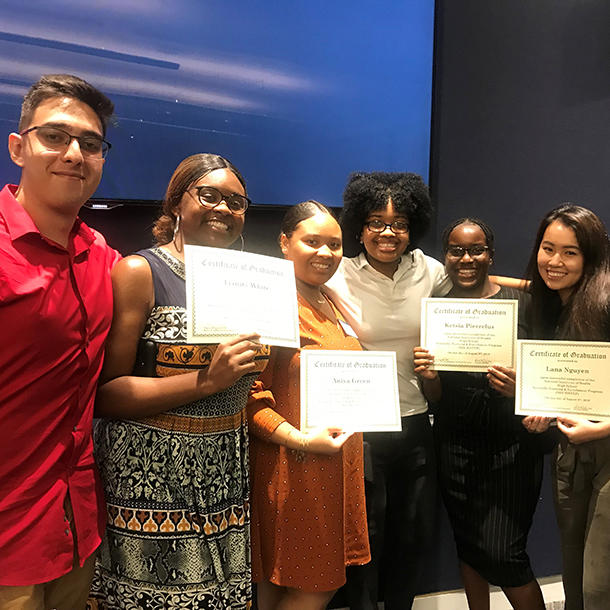Area Students Learn from DCEG Volunteers at NIH High School Scientific Training and Enrichment Program (HiSTEP)
In July 2019, Jackie Lavigne, Ph.D., M.P.H., Diane Wigfield, and Cara Murray, of the DCEG Office of Education, Mone’t Thompson, a fellow in the Clinical Genetics Branch of DCEG, and Zach Farley, a summer intern in the Division of Cancer Control and Population Sciences, taught twenty-five students in the NIH High School Scientific Training and Enrichment Program (HiSTEP) about population science and campaigns to promote and improve public health. With their guidance, the students then created public service announcement style videos about the risks and consequences of excess screen use, screen addiction, and social media usage among children and teens.
“Most of the students had experience using their personal social media accounts to create stories. Throughout the week, they adapted their creative processes to develop well-researched, targeted, and creative public service announcements. They did an amazing job,” said Ms. Murray. Over the course of the HiSTEP program, students were also able to interact with NIH scientists to learn more about their research, form relationships with mentors, and deepen their interest in biomedical and STEM careers.
Every year, the NIH Office of Intramural Training & Education selects a diverse group of talented high school students from the Washington, DC-metro area to participate in HiSTEP. The goal of the program is to diversify and expand the pipeline for training in biomedicine and healthcare by providing opportunities for individuals from schools with a large population of financially disadvantaged students. Ms. Thompson explained, “Imposter syndrome is a real struggle that I have personally dealt with and continue to deal with as I advance in my education and in professional settings where people like me are not equally represented—people who are minorities, are low income, and come from non-traditional households. The opportunity to work with these students was more than just another extracurricular that I could easily add to my resume. This program provides the unique opportunity to help students realize their full potential and firmly believe that they are fully deserving and certainly not imposters.”
HiSTEP participants take part in a seven-week, full-time summer internship on the main NIH campus in Bethesda, MD. Students explore the breadth of the scientific enterprise, the importance of biomedical research, and many STEM-M careers. They participate in workshops, lectures, and hands-on activities designed to prepare them for college and career readiness. Read more about HiSTEP.
